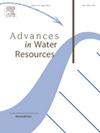结合储水变化和前期降水的动态Budyko框架评估典型喀斯特地区径流响应
IF 4.2
2区 环境科学与生态学
Q1 WATER RESOURCES
引用次数: 0
摘要
喀斯特地区具有双域含水层和快速入渗的特点,在应用为稳定集水区设计的传统水文模型时面临挑战。了解这些动态对于促进生态脆弱地区的水资源管理至关重要。传统的Budyko框架无法在更精细的时间尺度上捕捉喀斯特系统中更为尖锐的动态过程。本研究通过提出一个动态Budyko框架来解决这一限制,该框架明确地将土壤水分储存、地下水储存和先前降水的变化作为水可用性的关键驱动因素。通过对西南8个岩溶盆地1980—2020年的多时相分析,表明该修正有效地约束了Budyko域中的年和月数据,特别是解决了ET/P和ET0/P的月分布明显超过Budyko边界的现象。归因分析表明,径流对降雨最敏感,其次是景观特征和潜在蒸发量。为了进一步剖析气候影响,我们提出了一个基于et0的分解框架,特别隔离了气象驱动因素。二次分析表明,相对湿度在控制蒸散量的气候变量中主导径流变化。此外,喀斯特地区Budyko参数ω的月变化趋势明显高于非喀斯特地区,这可能与该地区独特的水文地质构造有关。该研究为喀斯特系统提供了一个有效的工具,使气候和人为影响在时间尺度上的精确分离成为可能。这些发现证明了Budyko理论的适用性,并为极端气候加剧下的可持续水资源管理提供了重要见解。本文章由计算机程序翻译,如有差异,请以英文原文为准。

A dynamic Budyko framework incorporating water storage changes and antecedent precipitation to assess runoff response in typical karst regions
Karst regions, characterized by dual-domain aquifers and rapid water infiltration, pose challenges when applying traditional hydrological models designed for stable catchments. Understanding these dynamics is critical for advancing water resource management in ecologically fragile areas. The traditional Budyko framework fails to capture the dynamic processes at finer temporal scales that are more acute in karst systems. This study addresses this limitation by proposing a dynamic Budyko framework that explicitly incorporates changes in soil water storage, groundwater storage and antecedent precipitation as key drivers of water availability. Through a multi-temporal analysis of eight karst basins in Southwest China (1980–2020), we demonstrated that the modification effectively constrained annual and monthly data within the Budyko domain, particularly resolving the phenomenon where the monthly distributions of ET/P and ET0/P significantly exceeded the Budyko boundaries. Attribution analysis showed that runoff was most sensitive to rainfall, followed by landscape characteristics and potential evaporation. To further dissect climatic influences, we proposed a ET0-based dscomposition framework specially isolating meteorological drivers. This secondary analysis demonstrated that relative humidity dominated runoff variation among climatic variables controlling ET0. Furthermore, the monthly variation of Budyko parameter ω in karst regions exhibited distinct trends compared to non-karst regions, which was likely attributed to region’s unique hydrogeological structures. This study offers an efficient tool for karst systems, enabling the precise separation of climatic and anthropogenic impacts across temporal scales. These findings demonstrate the applicability of Budyko’s theory and provide critical insights into sustainable water management under intensifying climatic extremes.
求助全文
通过发布文献求助,成功后即可免费获取论文全文。
去求助
来源期刊

Advances in Water Resources
环境科学-水资源
CiteScore
9.40
自引率
6.40%
发文量
171
审稿时长
36 days
期刊介绍:
Advances in Water Resources provides a forum for the presentation of fundamental scientific advances in the understanding of water resources systems. The scope of Advances in Water Resources includes any combination of theoretical, computational, and experimental approaches used to advance fundamental understanding of surface or subsurface water resources systems or the interaction of these systems with the atmosphere, geosphere, biosphere, and human societies. Manuscripts involving case studies that do not attempt to reach broader conclusions, research on engineering design, applied hydraulics, or water quality and treatment, as well as applications of existing knowledge that do not advance fundamental understanding of hydrological processes, are not appropriate for Advances in Water Resources.
Examples of appropriate topical areas that will be considered include the following:
• Surface and subsurface hydrology
• Hydrometeorology
• Environmental fluid dynamics
• Ecohydrology and ecohydrodynamics
• Multiphase transport phenomena in porous media
• Fluid flow and species transport and reaction processes
 求助内容:
求助内容: 应助结果提醒方式:
应助结果提醒方式:


